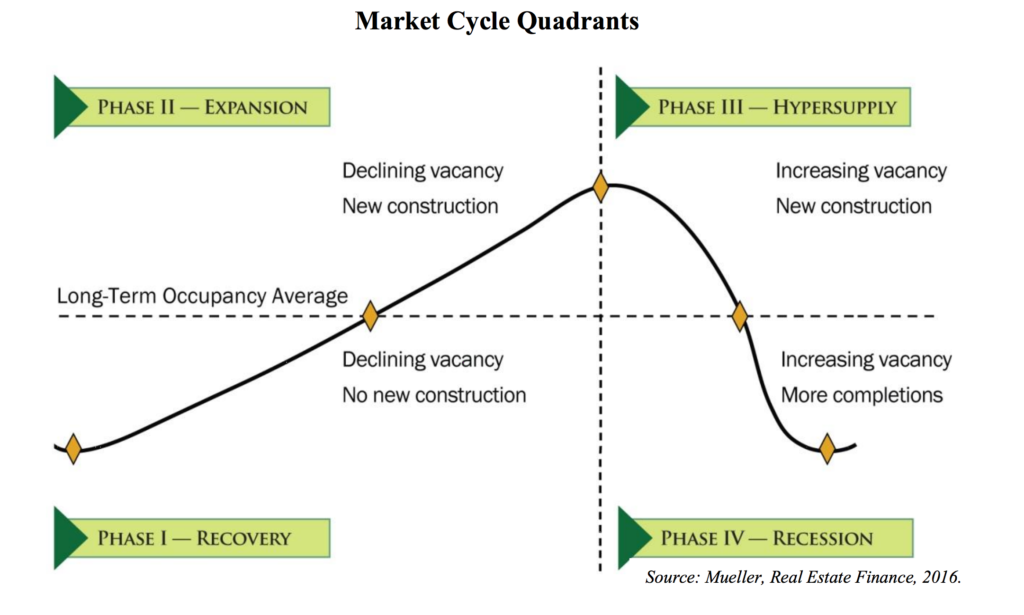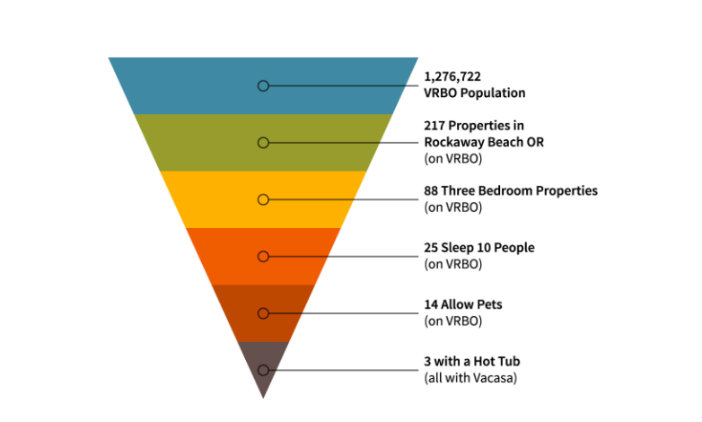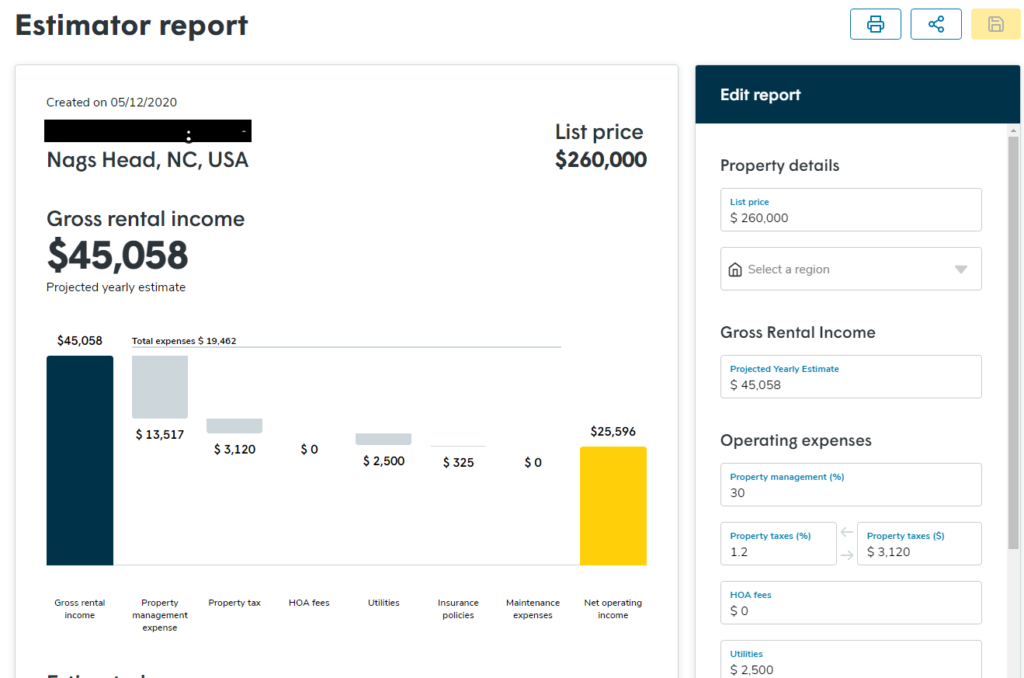Welcome back to the beach! The Outer Banks is officially reopening to visitors and we’re so happy to see everyone again. After the events of the past couple of months, many investors are watching real estate trends closely. Surfing requires timing and the ability to read the water in order to catch the perfect wave. Finding the perfect OBX investment property is no different – you need to be aware of trends, data, and have tremendous timing in order to maximize the potential return on your investment. So let’s get started! Here are 5 tips for buying your first Outer Banks investment property.
1) Understand the Real Estate Cycle
Let’s start with a basic graphic of the real estate cycle and why timing is so important-

In each phase of the real estate cycle, we can figure out where we are based on a handful of indicators. The goal in timing the purchase of an investment property is to do it close to the bottom (recession) or early in the recovery process. Here are some indicators for each stage:
Recession – Unemployment rises, interest rates fall, businesses shutter and panic causes people to conserve
Recovery – High level of fear/panic, interest rates stable and low, home sales/rentals flat, gradually increasing
So what data do we have to guide us in early May of 2020? First of all, we know unemployment has risen sharply within the past 2 months due to the Covid-19 lockdowns. Second, interest rates have fallen recently, setting an all-time low last week based on data going back to 1971. Rates have inched up slightly this week, but are remaining stable. Third, many businesses (especially retail and restaurants) are filing bankruptcy or dangerously close to it. And we can all agree there has been a high degree of panic and fear in the last 2 months, the question is how close to the bottom are we right now? Was it a short-term event with rapidly contracting GDP which will expand just as quickly, is there still more economic disaster to come, or will there be a slow recovery?
For all of that grim news, there are reasons for optimism already. For one thing, the stock market shrugged off the economic contraction. It recovered well before the jobs market and housing markets during the “great recession” in 2008, but it was a leading indicator of recovery. Secondly, interest in home buying is on the rise. After a dip in interest in March, page views of for-sale properties on Zillow were up significantly year-over-year. In fact, searches for some areas near the Outer Banks were up 19% over last year.
Equip yourself with information like this when you are considering buying your first Outer Banks investment property. There’s a more thorough article here that contains great information. If you can time it right, you could capitalize on a great deal that will provide you with a tremendous return on your investment. Let’s talk about what kind of property to look for, now that you know how to time your purchase!
2) Focus on Rent
It sounds obvious, but the #1 method of generating revenue can become lost in the process of identifying, offering, and closing on an investment property. Some investors are always looking for the “deal you can’t refuse” but in reality, if a home doesn’t generate consistent rental revenue, it won’t provide an oustanding ROI. You may find that old Nags Head oceanfront cottage that you’ve dreamed of owning since you were a kid, but ask yourself a few questions first. How close is it to the ocean and what are the rates of erosion? What is the annual maintenance cost for upkeep of a home built 40 years ago? How expensive is it to replace cedar shake siding and how frequently do you need to replace it? How well does this classic cottage rent compared to new construction homes nearby?
Sometimes we see a property listed and we imagine spending a couple of owner weeks inside, mere steps from the ocean. It might be exactly what we want, but what do renters want? You may not own a pet, but many renters do. In fact, some of the basic requirements for many vacation renters are small things such as pet-friendly, close to the beach, and a nice kitchen.
If your home doesn’t check a certain number of boxes for these renters, they won’t even know your home exists! They won’t see it in the search results when they filter based on their desired amenities. The guy across the street might have his home put in front of hundreds more people than yours if you don’t have a basic set of amenities. Check out this graphic from Shaun Greer (who invested in property in Oregon), to see how having the right amenities can “keep you in the game” when people are searching for a rental:

So keep it simple when buying your first Outer Banks investment property – look for a home that appeals to the broadest audience possible. Based on a 2018 industry survey, vacationers pick their beach home based on 3 main criteria – location, square footage, and reviews. They want a home as close to the beach as possible (within their price range), they want a home with a little extra room for them to relax, and they want to know that other vacationers have had a great time in your home. If you can time your purchase right, and you find a home close to the ocean with decent square footage, you’re ready for the next step. And it will determine whether your home gets rave reviews or constant complaints.
3) Hire an Expert to Manage Your Property
For most vacation rental owners here on the Outer Banks, they use the services of a property management company. In exchange for a commission on your weekly rentals, property management companies will take care of your property for you. This means they will advertise your home for rent, collect those rents, disburse them to you, arrange for guests to enter your property, they will have cleaners and inspectors who make sure your home looks as great as it possibly can every time a renter walks through your door. Now, not all property management companies are created equal.
One of the biggest decisions you can make after buying an investment property is selecting which company you want to work with. I encourage all of my clients to meet with representatives and have a serious talk about the numbers involved. If your investment home was previously used as a vacation rental, that company will have records to show you how much rental revenue the home generated under their stewardship. Often these documents are posted in the MLS and your real estate agent should have access to it. You want to have this information BEFORE you even submit an offer on a property. It will give you a basic framework and a set of expectations when you sit down later with property management company representatives.
Armed with the historical data, you can have productive conversations and realistic expectations of what kind of annual revenue your home should generate. I worked with vacation rental companies for many years here on the Outer Banks, and I can tell you that property owners and property managers get along great when both parties have a set of realistic agreed-upon set of expectations. If you want those 4-star reviews and stories of guests who LOVE your home and can’t wait to return next year, you’ll need a property management company that offers 4-star service.
There are some people here who rent out ground-level apartments or condo units next door on AirBnB or other similar sites. But if you’re approaching this as an investment and not a second job, you should have an expert manage your property for you. Even with commissions and fixed/variable expenses factored in, beach homes here on the Outer Banks can provide positive cash flow. Speaking of cash flow, we’re on to tip #4!
4) Learn the Lingo
So you’ve embarked on buying your first Outer Banks investment property, but what the heck is a cap rate or NOI? Here’s a quick primer to get you started:
Cap Rate – put simply, it’s the rate of return on a real estate investment.
Net Operating Income (NOI) – a measurement of a property’s ability to generate a positive income
Fixed Expenses – monthly costs that do not change due to usage (mortgage payment, insurance, etc)
Variable Expenses – monthly costs that may fluctuate due to usage (utilities, management fees, etc)
Cash Flow – the amount of profit you bring in each month after collecting rent, paying expenses & repairs
That doesn’t seem so bad, right? Well there are degrees of investors and some are just starting out with their first investment property, while others have an entire portfolio of properties. Maybe they’re only concerned with two main items – cap rate and cash flow. They may not even consider a property with a 4 cap rate, and only want 8 or higher. They may have a requirement for a minimum $1,000 monthly cash flow. As a first-time investor, your dream might be to have a place at the beach that “pays for itself” and affords you a few weeks per year to live in your beach house. Or you might be focused on numbers only, and you want to find the highest ROI property because you already own a home at the beach.
No matter your background, these numbers should be crucially important to you. After all, an investment is made in order to get a return. Let’s take a simple example for now, and if you’re looking for a more detailed explanation check out this great guide from Glenn Carter.
We found an adorable oceanfront Nags Head cottage listed for $500,000. We’ve calculated annual rental income at $30,000 and subtracted all of our operating expenses like property management fees, utilities, maintenance, etc which totaled $10,000. That leaves us with a $20,000 net operating income (NOI). To get the cap rate we divide the NOI by the purchase price, and we get a 4% cap rate ($20,000 divided by $500,000).
We also found a brand new home with more square footage but it’s a block from the ocean. It’s listed for $400,000. We calculated annual rental income at $24,000 and subtracted $8,000 in operating expenses. So we have a $16,000 NOI. When we divide NOI by purchase price, we end up with a cap rate of… 4%.
But what happens when we look carefully at the NOI of the Nags Head cottage? Are there ways we could lower those monthly operating expenses? Could we get rid of satellite TV and just setup some Roku TVs or bundle cable TV+internet? What if we replace the old water heater with a tankless heater? Could we do some things up front to reduce those costs and give us a higher NOI? If you found a way to save an extra $1,000/month with the Nags Head cottage, your cap rate would jump to 4.2%.
There are tons of calculators on the internet and tools that you can use to calculate these items and really dial in the type of return you’re looking for. If you don’t want to deal with the numbers, find a real estate agent who can provide these numbers for you. I’m a Vacasa-certified Expert Agent so I have access to some useful tools when it comes to vacation rental investments. Which leads me to my 5th tip…
5) Choose the Right Agent!
If you’re thinking about buying your first Outer Banks investment property, you should be searching for an agent who can help guide you through the process. Seasoned investors may have advisors or spreadsheet tools they use to decide which property they want to purchase (and how much they want to offer). When you are starting out there’s a LOT of information that you’ll be given. Some agents may assume that you’re already familiar with the terminology if you’re inquiring about investment properties, and it can be a little overwhelming to see pages upon pages of just…. numbers. Here’s an example of the reports I generate for clients:

Whether you choose me or another agent on the Outer Banks, I hope this article has helped provide a little background on the process of buying an investment property here. We have a unique market and some great property management companies who go out of their way to ensure that guests in these rental homes are given a great experience. If you can time it right, choose a great property, and hire the right property manager and real estate agent, you could have a low-stress investment home at the beach.
Not a bad way to start your real estate portfolio!
—
You can reach Stephen at 252-216-9230 or send him an email at stephen@cbseaside.com